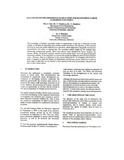| dc.contributor.author | Nair, S. | |
| dc.contributor.author | Vokolkova, V. | |
| dc.contributor.author | Abadjieva, T. | |
| dc.contributor.author | Michalek, J. | |
| dc.date.accessioned | 2010-11-04T11:49:07Z | |
| dc.date.available | 2010-11-04T11:49:07Z | |
| dc.date.issued | 2000 | |
| dc.identifier.citation | Nair, S. et al.(2000) Analysis of gender differences in education for engineering career (Gaborone case study), Botswana Journal of Technology, Vol.9,No.1, pp.1-8 | en_US |
| dc.identifier.issn | 1019 1593 | |
| dc.identifier.uri | http://hdl.handle.net/10311/647 | |
| dc.description.abstract | The percentage of students, especially women in engineering, is very low in Botswana and the country is still heavily dependent upon foreign human resources.The objective of this research has been to study the gender differences in education,which might have caused the current poor representation of women in engineering.The secondary school results of 749 students were statistically analyzed per gender.Three main factors were identified by factor analysis:The science-ability, the general aptitude and the memory ability factor.As to the general aptitude and the memory ability,it was found that no statistically significant difference between boys and girls exists.However, there is a difference in the science-ability factor. To strengthen this factor for girls,it requires to make the study of mathematics and science courses attractive to girls at early stage so that they are not limited in their options at the level of secondary education and thus in their career choice. | en_US |
| dc.language.iso | en | en_US |
| dc.publisher | University of Botswana | en_US |
| dc.subject | Gender in education | en_US |
| dc.subject | Engineering career | en_US |
| dc.subject | Botswana | en_US |
| dc.title | Analysis of gender differences in education for engineering career (Gaborone case study) | en_US |
| dc.type | Published Article | en_US |
| dc.rights.holder | University of Botswana | en_US |

